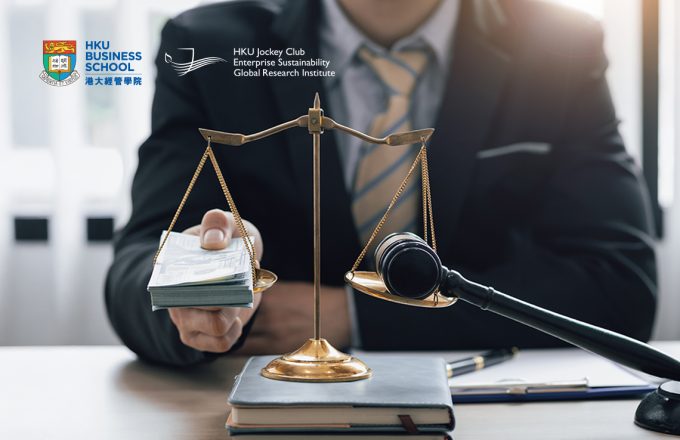Purple Haze, All in My Brain

iStock.com/Liyao Xie
Air pollution: The scourge of the developed and developing world. Clouder of views, clogger of lungs, atmosphere wrecker, early killer. There is no question that this foul miasma is dangerous – countless studies have been conducted around the planet measuring its ill effects on everything from cardiac rhythms to taste buds to pet dogs.
As it turns out, air pollution can literally get inside your head too, negatively affecting mood and cognitive functioning, which can have implications for business decision-making as well.
Jian Zhang from the HKU Business School along with authors from the Shanghai Advanced Institute of Finance at Shanghai Jiao Tong University, INSEAD in Singapore and the PBC School of Finance at Tsinghua University, helped to advance understanding of this phenomenon in their recent paper, called Air Pollution, Behavioral Bias, and the Disposition Effect in China. The team studied how air pollution can affect mental health by intensifying a certain type of cognitive bias observed in financial markets.
Measuring how pollution affects investments
The starting point for their investigation lay in a common paradox they noted in modern economies: “On one hand, industrial development and economic activities are often associated with severe pollution in developing countries … On the other hand pollution is known to affect human health, which should theoretically reduce the well-being and effectiveness of individuals participating in economic activities and thus the pace of economic development.”
But how can we quantify how pollution affects investment behaviour? Is there a measurable, causal impact? The authors motivated their investigation using new World Health Organization findings that air pollution can “affect humans’ mood, cognition, and mental well-being,” and followed this line of thinking through the perspective of investors and their trading behaviour. They surmised that since this behaviour is influenced by mental condition and brain functioning, and because biases arise when cognition is limited, then air pollution could be expected to “induce investors to exhibit more biases in their trading.”
Yes, that is quite a leap to make, but the authors found some excellent-quality data that makes it feasible to validate this hypothesis: a proprietary data set from one of China’s largest mutual fund families consisting of complete trading information for almost 774,000 individual accounts from seven equity funds. The massive data set spanned the years 2007 to 2015 and encompassed 247 cities in all of mainland China’s 31 provinces.
They also collected data from China’s air quality index (AQI) for the same time frame and geographical areas – concentrating on AQI values above 100 which indicate a high level of air pollution.
The diabolical disposition effect
They then compared all this data to a well-known and highly significant trading anomaly: the disposition effect, a phenomenon first described in Shefrin & Statman (1985) whereby investors “tend to sell winning investments prematurely to lock in gains and hold on to losing investments too long in the hope of breaking even.” Another definition explains the effect as a “robust empirical fact that individual investors have a greater propensity to sell stocks [that are] trading at a gain relative to purchase price, rather than stocks [that are] trading at a loss.” Despite widespread study, the causes of the disposition effect are still under debate, but in the world of finance, it is “typically viewed as [being] among the most prominent trading mistakes of investors originating in cognitive bias.”
Tying the disposition effect to air pollution would be a very big deal, and the authors’ study does it, producing some of the first evidence linking air pollution to behavioural finance. Their work may lead to the creation of better policies that will eventually improve the efficiency of the financial markets and produce a more fair distribution of wealth amongst investors.
Tracing the cause
But let’s not get ahead of ourselves, first things are first: How did the authors prove a causal connection between air pollution and this trading anomaly? To start, they used the data set to calculate a measure of city-wide disposition effects by aggregating data on investors’ accounts and then determining the difference between the probability of investors selling “winners” and the probability of them selling “losers”, based on their trading histories. They then looked at the general relationship between the disposition effect and air pollution by sorting the disposition effect data and AQI data into different portfolios.
Immediately, they found a strong positive correlation – when a particular city has a high AQI, investors were three to four times as likely to exhibit a high disposition effect than when the level of pollution is medium or low. The figures also revealed that traders in high-AQI cities performed significantly worse than low-AQI cities, by between 3.4 and 8.97% depending on statistical adjustments.
But as we all know so well: Correlation does not equal causality. Finding a causal link required a number of tests. Number one involved the wind. Wind is wonderfully efficient at dissipating air pollution – and naturally helpful to our researchers. By using a “difference-in-difference” test, they measured AQI figures in two sets of cities: One set had high AQI levels in the early part of a week, followed by a sharp drop in these levels after a strong wind; the other had high AQI levels all week long. The thinking was that the investors’ disposition effect in the “windy cities” would drop in the later part of the week, while the effect in “non-windy cities” would remain the same. A couple of iterations of this test were run, and the results remained robust.
The second strategy to establish causality is to exploit a unique Chinese central government strategy informally known as the “Huai River policy”, whereby free heating in the winter is provided to homes and offices located to the north of the Qinling–Huaihe Line, corresponding roughly to the 33rd parallel , but not to residents south of this line. The heating provided by this policy is almost exclusively generated by burning coal – producing very high levels of air pollution. Previous studies have found that this policy has resulted in increased incidence of cardiorespiratory mortality and decreased life expectancies, with one estimating that in the 1990s, 500 million residents of northern China “experienced a loss of more than 2.5 billion life years”.
Again, the evidence points to a causal impact of air pollution: The disposition effect “decrease drastically” when we move from cities north to the south of the Qinling–Huaihe Line The effect is significant only during the heating seasons indicating that “additional air pollution is created by the free heating policy”.
These two tests support air pollution being a causal factor in the disposition effect. What’s more, trading volume did not seem to be affected – “suggesting that air pollution mainly induces investors to make more mistakes as opposed to engaging in more (or less) trading”. This is a momentous finding – essentially saying that poor air quality can make intelligent people make bad decisions in the course of their daily work.
But how?
The last big question of this paper was a simple “how”? How exactly does air pollution get inside people’s heads? The team turned to studies on mental well-being in investors, in particular looking at the notion that people take action to self-regulate their moods so as to maintain good moods and, crucially – eliminate bad moods. These actions take many different forms, including shopping or exercising or, according to a number of sources, trading stocks. Which brings us to the authors’ central observation: “Investors suffering from air pollution-induced mood disorders may find losses painful to realize. Instead, they resort to realizing gains as a potential therapy to offset the negative influence of bad moods, thereby exhibiting the disposition effect.”
Validating this observation required more work, with two important implications to consider: First, since air pollution-induced mood disorders induce investors to sell more “winners”, it means they may lose out on “momentum profitability” – the propensity for stocks to continue rising in price for a particular length of time – meaning their trading mistakes are intensified. Second, investors will gain pleasure (or “utility bursts”) from not only making money, but making larger amounts of money, implying that they will make bigger trades on days with more severe pollution.
Again, the large data set helped to confirm both of these implications. Regarding the momentum implication, they found that the tendency to sell “past winners” (investments that had already made money) to realise quick gains was intensified on highly polluted days. Further analysis revealed that had these holdings not been sold, three weeks later, they would have been worth as much as 11.28% more – undoubtedly a painful statistic for investors to see! Regarding the utility burst implication, the data revealed that “investors indeed sell gains with larger magnitudes on more severely polluted days”.
Important results for the world
Finding a concrete link between air pollution and human decision making is a long and winding path involving a vast number of variables. After all, human moods can be influenced by so many factors, the air we breathe being just one of them. The authors recognise this and do not make any outlandish claims that go beyond the scope of their work.
Nevertheless, this study has pushed the field of behavioural finance forward in several areas: The authors have added more evidence to the study of the disposition effect; underscored the fact that “social factors seemingly unrelated to financial markets” may influence investor behaviour; reinforced scientific findings that air pollution is harmful to mental health; and drawn attention research examining the relationship between weather conditions and stock market returns.
By moving the needle in so many ways, this study may achieve more than it set out to. By showing that air pollution may be responsible for significant investment losses – in addition to all its other ill effects – the authors may galvanise a response from the highest circles of finance and politics. Businesses need to act on this information by adopting clean technology, relocating, and better controlling indoor air quality. For regulators, a wide scheme of tax (on pollution) and incentive policies (on green tech) may be necessary to address the issue.” As they conclude, “Our study thus calls for more attention and action from regulators and researchers to better protect the environment in our modern society.“
Let us hope this action is swift, successful and before, to paraphrase Jimi Hendrix, tomorrow becomes the end of time.
About this Research
Li, J. J., Massa, M., Zhang, H., & Zhang, J. (2021). Air pollution, behavioral bias, and the disposition effect in China. Journal of Financial Economics, 142(2), 641-673.
References
Almond, D., Chen, Y., Greenstone, M., Hongbin, L., 2009. Winter heating or clean air? unintended impacts of China’s Huai river policy. Am. Econ. Rev. Pap. Proc. 99, 184–190.
Arain, M.A., Blair, R., Finkelstein, N., Brook, J.R., Sahsuvaroglu, T., Beckerman, B., Zhang, L., Jerrett, M., 2007. The use of wind fields in a land use regression model to predict air pollution concentrations for health exposure studies. Atmos. Environ. 41, 3453–3464.
Chen, Y., Ebenstein, A., Greenstone, M., Li, H., 2013. Evidence on the impact of sustained exposure to air pollution on life expectancy from China’s Huai River policy. PNAS. 110 (32): 12936-12941.
Frydman, C., Barberis, N., Camerer, C., Bossaerts, P., Rangel, A. Using Neural Data to Test A Theory of Investor Behavior: An Application to Realization Utility. J Finance. 2014;69(2):907-946.
Graff Zivin, J., Neidell, M., 2013. Environment, health, and human capital. J. Econ. Lit. 51, 689–730.
Hirshleifer, D., 2015. Behavioral finance. Ann. Rev. Financ. Econ. 7, 133–159.
Isen, A., Rossin-Slater, M., Walker, W.R., 2017. Every breath you take—every dollar you’ll make: the long-term consequences of the clean air act of 1970. J. Polit. Econ. 125, 848–902.
Morris, W.N., Reilly, N.P., 1987. Toward the self-regulation of mood: theory and research. Motiv. Emot. 11, 215–249.
Shefrin, H., Statman, M., 1985. The disposition to sell winners too early and ride losers too long: theory and evidence. J. Finance 40, 777–790.
Swedroe, L. The disposition effect: Why traders sell at the wrong time. The Evidence-Based Investor. (2021, November 24). Retrieved April 10, 2022, from https://www.evidenceinvestor.com/the-disposition-effect-why-traders-sell-at-the-wrong-time/
Thayer, R.E., Newman, J.R., McClain, T.M., 1994. Self-regulation of mood: strategies for changing a bad mood, raising energy, and reducing tension. J. Pers. Soc. Psychol. 67, 910–925.
World Health Organization, 2016, Ambient (outdoor) air quality and health available at: https://apps.who.int/iris/bitstream/handle/10665/ 250141/9789241511353-eng.pdf.
Zheng, S., Kahn, M.E., 2013. Understanding china’s urban pollution dynamics. J. Econ. Lit. 51, 731–772.







